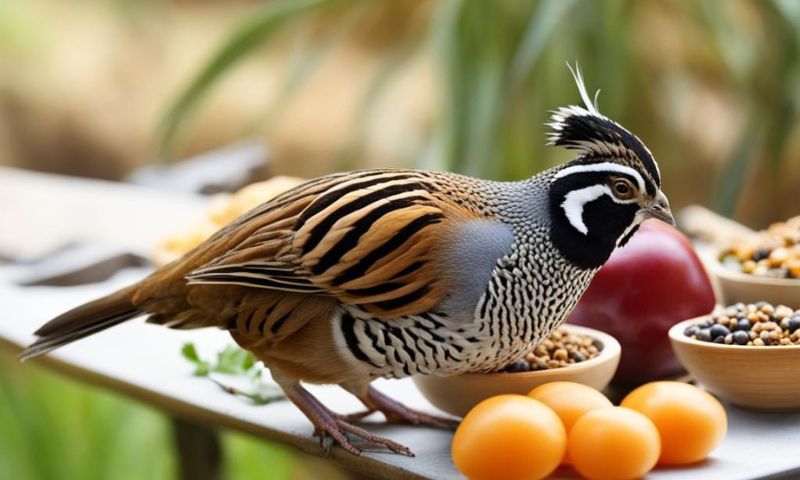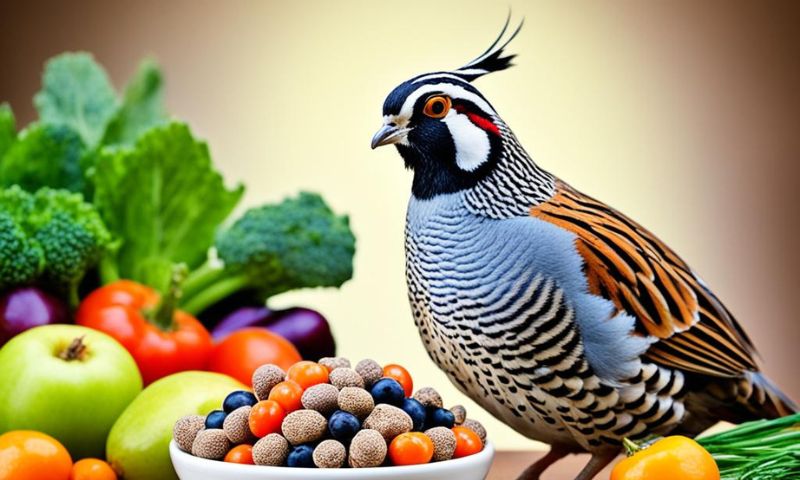Senior Quail Diet: Nutritional Considerations
Welcome to our comprehensive guide on senior quail diet. As your quails age, it becomes crucial to pay attention to their nutritional needs to ensure their health and well-being. In this article, we will explore the key nutritional considerations for senior quails and provide guidelines for creating a well-balanced diet.
Understanding Aging Quail Nutrition
As quails age, their nutritional needs change, requiring specific attention to their diet to ensure their continued health and well-being. In this section, we will explore the unique considerations for age-specific quail nutrition and delve into the importance of providing proper nutrition for elderly quails.
When it comes to nutrition for elderly quails, there are key nutrients that play a crucial role in maintaining their health. These nutrients include:
- Protein: Essential for tissue repair, muscle maintenance, and egg production.
- Vitamins and Minerals: Necessary for overall health, immunity, and proper organ function.
- Antioxidants: Help combat oxidative stress and support cellular health.
- Fiber: Aids in digestion and promotes gut health.
Providing age-specific nutrition for quails requires a careful balance of these nutrients. Age-related changes in metabolism and digestion may affect how quails absorb and utilize essential nutrients. Therefore, it is crucial to tailor their diet to meet their specific needs.
Age-specific quail feed formulas are available in the market, explicitly designed to address the nutritional requirements of aging quails. These formulas typically have higher levels of essential nutrients and adjusted ratios to support their age-related challenges.
It is important to note that elderly quails may have a reduced appetite, which can lead to nutrient deficiencies. Providing a well-balanced and enticing diet is crucial to ensure they consume enough nutrients to maintain their health.
Feeding elderly quails a variety of fresh foods such as chopped greens, vegetables, and fruits can help stimulate their appetite and provide essential vitamins and minerals. Ensuring a steady supply of clean water is also essential for their hydration and overall well-being.
By understanding the unique nutritional needs of aging quails and providing them with age-specific quail nutrition, we can support their health and quality of life as they enter their golden years.

Feeding Guidelines for Senior Quails
As quails age, their nutritional needs change, requiring adjustments to their diet to support their health and well-being. Here are some practical feeding guidelines to ensure your senior quails receive the necessary nutrients:
1. Portion sizes: Senior quails have lower energy requirements compared to younger birds. It’s essential to provide them with portion sizes appropriate for their age and activity levels. Avoid overfeeding to prevent obesity and related health issues.
2. Feeding frequency: Offering smaller, more frequent meals throughout the day is beneficial for senior quails. Aim for three to four feeding sessions, spaced evenly, to ensure they consume an adequate amount of nutrients without feeling overwhelmed.
3. Suitable food options: Provide a well-balanced diet that includes high-quality sources of protein, such as insects, worms, or commercially available quail feed. Include a variety of greens, vegetables, and fruits to fulfill their vitamin and mineral requirements. It’s crucial to offer foods that are easy to digest and promote optimal gut health.
4. Consider supplementing: Aging quails may benefit from supplements that support joint health, such as glucosamine and chondroitin. Consult with your veterinarian to determine if additional supplements are necessary based on your quails’ specific needs.
5. Encouraging proper nutrition intake: Some senior quails may develop a decrease in appetite or difficulty eating certain foods. To encourage proper nutrition intake, ensure a calm and quiet feeding environment. Offer a variety of textures and flavors to entice their appetite and consider providing softer food options, like mashed vegetables or soaked pellets, for easier consumption.
“Proper nutrition is the foundation for maintaining the health and vitality of senior quails.”
By following these feeding guidelines, you can provide your senior quails with the optimal nutrition they require as they age. Additionally, monitoring their body condition and consulting with a veterinarian regularly will help ensure their nutritional needs are met for a happy and healthy life.
Health Considerations for Aging Quails
As quails age, it is important to be aware of the potential health issues they may face. By understanding these considerations, you can take proactive steps to maintain their health and well-being. Additionally, providing the right nutrition plays a crucial role in preventing and managing these conditions. Here are some key health considerations for aging quails:
- Joint and Mobility Issues: Aging quails may experience joint and mobility issues, such as arthritis. These conditions can affect their ability to move around and access food and water. Providing a comfortable and spacious living environment, with easy access to food and water sources, can help alleviate these issues.
- Decreased Immune Function: As quails age, their immune system may weaken, making them more susceptible to infections and diseases. A well-balanced diet with immune-boosting nutrients, such as vitamins C and E, can help support their immune function and overall health.
- Digestive Problems: Aging quails may experience digestive issues, such as decreased appetite or difficulty digesting certain foods. Including easily digestible foods in their diet, such as cooked grains and soft vegetables, can help ensure adequate nutrition intake.
- Egg Laying Challenges: Older quails may experience a decline in egg production or encounter difficulties in egg-laying. Providing calcium-rich foods, like crushed oyster shells, can support their reproductive health and prevent calcium deficiency.
Regularly monitoring the health of aging quails is essential. Keep an eye out for any changes in behavior, appetite, or droppings. If you notice any signs of illness or discomfort, it is important to seek veterinary care promptly.

By understanding the health considerations for aging quails and maintaining their health through proper nutrition and care, you can ensure that they enjoy a comfortable and fulfilling life in their senior years.
Conclusion
Providing proper care and nutrition for senior quails is crucial for their overall well-being and longevity. Throughout this article, we have highlighted the importance of understanding the nutritional considerations for aging quails and offering guidelines to ensure they receive a balanced diet.
One of the key takeaways is to pay attention to age-specific quail nutrition and make adjustments based on their changing needs. Older birds may require higher levels of certain nutrients to support their aging bodies. By incorporating nutrient-rich foods into their diets, such as high-quality protein sources and fresh vegetables, you can help maintain their health.
In addition to a well-balanced diet, it is essential to provide suitable feeding guidelines for senior quails. This includes portion sizes, feeding frequency, and the types of food options available. It’s also crucial to monitor their health regularly for any signs of illness or decline, seeking veterinary care when necessary.
To ensure the overall well-being of senior quails, it is important to create an environment that supports their needs. This includes providing a clean and comfortable living space, as well as opportunities for exercise and mental stimulation. Remember, a happy and healthy quail can lead to a longer and more enjoyable life.
FAQ – Senior Quail Diet
What are the nutritional considerations for senior quails?
Senior quails have specific nutritional needs that differ from younger birds. It is important to provide a well-balanced diet that includes a variety of nutrients to support their health and well-being.
What should be included in a senior quail diet?
A senior quail diet should consist of high-quality, protein-rich foods such as seeds, grains, and insects. It is also essential to provide essential vitamins, minerals, and water to ensure their overall health.
How often should I feed senior quails?
Senior quails should be fed twice a day, in the morning and evening, to ensure they receive an adequate amount of nutrition. Monitor their intake and adjust the portion sizes accordingly to avoid overfeeding or underfeeding.
What are some suitable food options for senior quails?
Suitable food options for senior quails include high-quality commercial quail feed, fresh fruits and vegetables, mealworms, and cooked grains. These options provide a good mix of essential nutrients to support their health.
How can I encourage proper nutrition intake in aging quails?
To encourage proper nutrition intake in aging quails, provide a variety of food options and ensure they have easy access to feeders and water sources. Observe their eating habits and consult with a veterinarian if you notice any changes in appetite or weight loss.
What are some health considerations for aging quails?
As quails age, they may be prone to certain health issues such as arthritis, respiratory problems, and egg-related complications. Providing a nutritious diet, maintaining a clean and comfortable living environment, and regular veterinary check-ups can help prevent and manage these conditions.
How can I monitor the health of senior quails?
Monitor the health of senior quails by observing their behavior, appetite, and droppings. Look for any signs of illness such as drooping wings, labored breathing, or changes in feces. If you notice any concerns, seek veterinary care promptly.
What are some additional care tips for senior quails?
In addition to providing a balanced diet, ensure that senior quails have a comfortable and spacious enclosure that allows for exercise and social interaction. Use soft bedding material to cushion their feet and provide perches or ramps to accommodate their mobility needs.